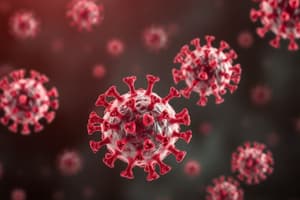Podcast
Questions and Answers
Which of the following is NOT a characteristic of Natural Killer (NK) cells?
Which of the following is NOT a characteristic of Natural Killer (NK) cells?
- NK cells recognize abnormal or cancer cells by a specific antigen on their cell membrane. (correct)
- NK cells attack infected or cancerous cells.
- NK cells attack transplanted organs.
- NK cells induce the target cell to undergo 'apoptosis' (cell suicide).
Which of the following innate internal defenses work by interfering with viral replication?
Which of the following innate internal defenses work by interfering with viral replication?
- Phagocytes
- T lymphocytes
- Interferons (correct)
- Complement proteins
How do phagocytes recognize foreign cells or bacteria?
How do phagocytes recognize foreign cells or bacteria?
- All the foreign cells or bacteria are marked with opsonins that the phagocytes recognize.
- Phagocytes recognize a specific antigen on the cell surface.
- The phagocytes look for the absence of 'self' proteins.
- The phagocytes recognize molecules on pathogens not normally found on body cells. (correct)
Which of the innate defense mechanisms can lyse bacteria and mark cells for phagocytosis?
Which of the innate defense mechanisms can lyse bacteria and mark cells for phagocytosis?
Which of the following can act as opsonins on bacteria, thus enhancing phagocytosis?
Which of the following can act as opsonins on bacteria, thus enhancing phagocytosis?
What constitutes the body's first line of defense against disease?
What constitutes the body's first line of defense against disease?
How do interferons protect against infection in healthy cells?
How do interferons protect against infection in healthy cells?
What is the specific target of interferons?
What is the specific target of interferons?
Which of the following is an effect of complement activation?
Which of the following is an effect of complement activation?
What types of antigen are recognized by T cells?
What types of antigen are recognized by T cells?
Which of the following is not characteristic of the adaptive immune system?
Which of the following is not characteristic of the adaptive immune system?
How does a lymphocyte become immunocompetent?
How does a lymphocyte become immunocompetent?
Which of the following statements does NOT describe the adaptive immune response?
Which of the following statements does NOT describe the adaptive immune response?
Which of the following exemplifies passive immunity?
Which of the following exemplifies passive immunity?
Which of the following best illustrates artificially acquired active humoral immunity?
Which of the following best illustrates artificially acquired active humoral immunity?
Select the correct statement about the function of antibodies.
Select the correct statement about the function of antibodies.
Flashcards are hidden until you start studying
Study Notes
Natural Killer (NK) Cells
- NK cells do not recognize abnormal or cancer cells by specific antigens on their membranes; instead, they utilize broad recognition mechanisms.
- Primary functions include attacking infected or cancerous cells and inducing apoptosis in target cells.
Innate Internal Defenses
- Interferons inhibit viral replication and act specifically on healthy cells to block infections.
Phagocytes
- Recognition of foreign cells by phagocytes is based on identifying unique molecules not present on normal body cells.
Complement Proteins
- Complement proteins can lyse bacteria and assist in marking cells for phagocytosis, enhancing immune response.
Opsonins
- Antibodies and complement proteins act as opsonins to enhance the phagocytosis process of bacteria.
First Line of Defense
- The body’s primary defense against disease consists of intact skin and mucous membranes, acting as barriers to pathogens.
Interferon Functionality
- Interferons protect healthy cells by producing antiviral proteins that block viral replication.
Targeting of Interferons
- Interferons specifically target nearby healthy cells to provide protection against viral infections.
Effects of Complement Activation
- One major effect of complement system activation is opsonization, which helps mark pathogens for destruction.
T Cell Antigen Recognition
- T cells recognize processed fragments of protein antigens displayed on the surfaces of body cells rather than free-floating antigens.
Characteristics of the Adaptive Immune System
- The adaptive immune system is antigen-specific, possesses memory, and operates systemically; it is not specific for a given organ.
Immunocompetence of Lymphocytes
- For a lymphocyte to become immunocompetent, it must specifically recognize its corresponding antigen through binding.
Adaptive Immune Response
- The adaptive immune response is not immediate; it takes time to develop after the body encounters foreign material.
Passive Immunity
- Passive immunity is exemplified by the use of antitoxins, which provide immediate protection without the host's immune response being activated.
Artificially Acquired Active Immunity
- The best example of artificially acquired active humoral immunity is through vaccines, which stimulate the immune system to produce its own antibodies.
Function of Antibodies
- Complement fixation is a key protective mechanism employed by antibodies against pathogens, allowing for efficient immune response.
Studying That Suits You
Use AI to generate personalized quizzes and flashcards to suit your learning preferences.




